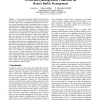Free Online Productivity Tools
i2Speak
i2Symbol
i2OCR
iTex2Img
iWeb2Print
iWeb2Shot
i2Type
iPdf2Split
iPdf2Merge
i2Bopomofo
i2Arabic
i2Style
i2Image
i2PDF
iLatex2Rtf
Sci2ools
144
click to vote
ICDCS
2006
IEEE
2006
IEEE
A Loss and Queuing-Delay Controller for Router Buffer Management
— Active queue management (AQM) in routers has been proposed as a solution to some of the scalability issues associated with TCP’s pure end-to-end approach to congestion control. However, beyond congestion control, controlling queues in routers is important because unstable router queues can cause poor application performance. Existing AQM schemes explicitly try to control router queues by probabilistically dropping (or marking) packets. We argue that while controlling router queues is important, this control needs to be tempered by a consideration of the overall lossrate at the router. Solely attempting to control queue length can induce loss-rates that have as negative an effect on application and network performance as the large queues that existing AQM schemes were trying to avoid. Thus controlling queue length without regard to loss-rate can be counterproductive. In this work we demonstrate that by jointly controlling queue length and loss-rate, both network and application pe...
Related Content
| Added | 11 Jun 2010 |
| Updated | 11 Jun 2010 |
| Type | Conference |
| Year | 2006 |
| Where | ICDCS |
| Authors | Long Le, Kevin Jeffay, F. Donelson Smith |
Comments (0)

